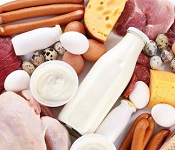
How Long Do Eggs and Egg Products Stay Safe and Usable?
Safely Storing Eggs and Keeping Them Fresh
The USDA has done research on the best temperatures to safely store eggs at home and how long the eggs will remain safe and usable.
The "Sell-By" date is not the same as a "use by" date. It's ok if the sell-by date expires while you have the eggs in the fridge. The eggs will be perfectly safe to use. Always purchase eggs before the "Sell-By" or EXP (expiration) date on the carton. To keep them safe, take eggs straight home and store them immediately in the refrigerator set at 35 to 40 °F. Leave the eggs in their carton and place them in the back of the refrigerator, not in the door.
| Egg Storage Chart | ||
|---|---|---|
| Product | Refrigerator | Freezer |
| Raw eggs in shell | 3 to 5 weeks | Do not freeze. |
| Raw egg whites | 2 to 4 days | 12 months |
| Raw egg yolks | 2 to 4 days | Yolks do not freeze well. |
| Raw egg accidentally frozen in shell | Use immediately after thawing. | Keep frozen; then refrigerate to thaw. |
| Hard-cooked eggs | 1 week | Do not freeze. |
|
Egg substitutes, liquid Unopened |
10 days | Do not freeze. |
|
Egg substitutes, liquid Opened |
3 days | Do not freeze. |
|
Egg substitutes, frozen Unopened |
After thawing, 7 days, or refer to "Use-By" date on carton. | 12 months |
|
Egg substitutes, frozen Opened |
After thawing, 3 days, or refer to "Use-By" date on carton. | Do not freeze. |
| Casseroles made with eggs | 3 to 4 days | After baking, 2 to 3 months. |
| Eggnog, commercial | 3 to 5 days | 6 months |
| Eggnog, homemade | 2 to 4 days | Do not freeze. |
| Pies, pumpkin or pecan | 3 to 4 days | After baking, 1 to 2 months. |
| Pies, custard and chiffon | 3 to 4 days | Do not freeze. |
| Quiche with any kind of filling | 3 to 4 days | After baking, 1 to 2 months. |
